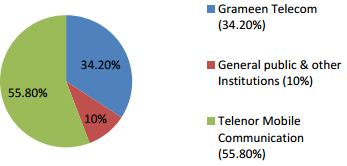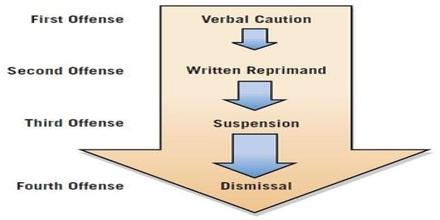Disciplinary Process of Grameenphone
Grameenphone is a dynamic and leading countrywide GSM communication solutions provider. It is a joint venture company between Telenor and Grameen. Grameenphone Ltd., the largest telecommunications service provider in Bangladesh, received its operating license in November 1996 and started its service from March 26, 1997.
History
Iqbal Quadir, who is the founder and director of the Legatum Center for Development and Entrepreneurship at MIT was inspired by the Grameen Bank microcredit model and envisioned a business model where a cell phone can serve as a source of income. He traveled back to Bangladesh, after meeting and successfully raising money from New York based investor and philanthropist Joshua Mailman, and worked for three years gaining support from various organizations, finally he was successful in forming a consortium with Telenor and Grameen Bank to establish Grameenphone in 1997.
This report is the result of my 3 months long internship program conducted in Grameenphone Ltd. and is prepared as a requirement for the completion of the BBA program of BRAC University. The report is prepared to fulfill the partial requirement of the course Human Resource Management. This report is supposed to be prepared through the analysis of various or focused HR activities in local successful organizations. The different aspects of Human Resource Management, which we learn in theory, should be compared with the real life scenario on the basis of practical implications. In this report I have tried to look into the most important part ‘Ethics & Compliance” in people and organization division of Grameenphone. I will also show how these activities support the organization’s overall strategy.
Methodology
The study is conducted in a systematic procedure starting from selection of the topic to final report preparation. This topic is fixed by my supervisor because I have to give a report to the company also which is based on the project where I assigned for. So, my supervisor gave me the topic “Disciplinary process of Grameenphone Ltd.”. The integral part was to identify and collect data. Those data were classified, analyzed, interpreted and presented in a systematic manner to find the vital points. For the purpose of the study data and information have been collected from both primary and secondary sources. My work experience in GP helped me a lot. Besides, some data have been collected through regular conversations with many GP employees and I also have interviewed some key personnel and also have taken some suggestions orally from the personnel of Grameenphone Ltd.
Primary Data:
Data for this report has been extracted from primary sources as well as secondary sources. The relevant information collected from primary sources was collected in an informal way. Primary sources were- visiting, personal observation & survey, face to face interview and practical deskwork.
Secondary Data:
Internal sources: Different reports and documents provided by concerned officer and different circulars, manuals and files of the organization.
External sources: Different websites related to the telecom sector, newspapers, and magazines.
Introduction
Grameenphone is widely abbreviated as GP. It is the leading telecommunications service provider in Bangladesh. With more than 50 million subscribers (as of October 2014), Grameenphone is the largest mobile phone operator in the country. It is a joint venture enterprise between Telenor and Grameen Telecom Corporation, a non-profit sister concern of the internationally acclaimed microfinance organization and community development bank Grameen Bank. Telenor, the largest telecommunications company in Norway, owns 55.8% shares of Grameenphone; Grameen Telecom owns 34.2% and the remaining 10% is publicly held.

Grameenphone was the first company to introduce GSM technology in Bangladesh. It also established the first 24-hour Call Center to support its subscribers. With the slogan Go Beyond, Grameenphone promises its customers to bring the best of communication technologies so that they can Go Beyond.
Headquarter of Grameenphone is situated at Bashundhara Residential Area. They also have around 14 buildings in Gulshan area, which was the previous headquarter of Grameenphone office. None of those are Grameenphone’s own building. The ―GP HOUSEǁ- Grameenphone, 9-story headquarter building is located adjacent to the main entrance of the Bashundhara Residential Area. The building was constructed by ―Associated Builders Corporation Limited” and Vistaara and Icon Architects (VIA) was the consultant.
History
The idea of providing universal mobile phone access throughout Bangladesh, including its rural areas, was originally conceived by Iqbal Quadir, who is currently the founder and director of the Legatum Center for Development and Entrepreneurship at MIT. He was inspired by the Grameen Bank microcredit model and envisioned a business model where a cell phone can serve as a source of income. After leaving his job as an investment banker in the United States, Quadir traveled back to Bangladesh, after meeting and successfully raising money from New York based investor and philanthropist Joshua Mailman, and worked for three years gaining support from various organizations including Nobel Peace Prize laureate Muhammad Yunus of Grameen Bank and the Norwegian telephone company, Telenor. He was finally successful in forming a consortium with Telenor and Grameen Bank to establish Grameenphone. Quadir remained a shareholder of Grameenphone until 2004.
Grameenphone received a license for cellular phone operation in Bangladesh from the Ministry of Posts and Telecommunications on November 28, 1996. Grameenphone started operations on March 26, 1997, the Independence Day in Bangladesh. Gameenphone originally offered a mobile-to-mobile connectivity (widely known as GP-GP connection), which created a lot of enthusiasm among the users. It became the first operator to reach the million subscriber milestone as well as ten million subscriber milestones in Bangladesh. Grameenphone has so far invested more than BDT 21,343 crore to build the network infrastructure. It is one of the largest taxpayers in the country, having contributed more than BDT 30,876 crore in direct and indirect taxes to the Government Exchequer over the years. There are now more than 1600 GP Service Desks across the country covering nearly all upazilas of all districts and 94 Grameenphone Centers in all the divisional cities. Grameenphone has about 5000 full and temporary employees. 300,000 people are directly dependent on Grameenphone for their livelihood, working for the Grameenphone dealers, retailers, scratch card outlets, suppliers, vendors, contractors and other.
Product/service offerings
Mobile Telephony:
Grameenphone was the first operator to introduce the pre-paid mobile phone service in Bangladesh in September 1999. It offers the pre-paid subscription under the name- Easy Prepaid which is currently called “Nishchinto, Amontron, Shohoj, Bondhu, Aapon, Smile, Spondon, Business Solution prepaid”. Besides, Nishchinto, Amontron, Shohoj, Bondhu, Aapon, Smile, Spondon, Business Solution, Grameenphone also offers a youth based mobile to mobile connectivity within Bangladesh name Djuice..
Grameenphone also offers postpaid mobile service. Xplore Postpaid is the name of its post paid service. Grameenphone also provides several other packages which can be selected based on the type of tariff or features like pulse, sms, and internet. Detailed information about packages provided by Grameenphone can be found dialing 121 from your Grameenphone number and can also be found using the official Grameenphone android app available for free download on Google Play Store.
In compliance with BTRC guidelines, GP is sharing its passive infrastructure with other operators under “Wholesale Business”. It has introduced different “Financial Services” as electronic ticketing, bill collection, electronic lottery and remittance disbursement under the brand “MobiCash”.
Other important services GP provides:
- Call drop: Grameenphone introduces “Call back on Call drop”. From October 1, 2014 all GP Pre-Paid and Post-Paid customers will get 60 second equivalent call reimbursements on every call drop.
- Internet: Grameenphone provides internet service in its coverage area. As it has EDGE/GPRS enabled network, any subscriber can access to internet through this network. Grameenphone was the first mobile operator in Bangladesh to offer EDGE services to its subscribers.
GP is also the country’s largest ISP, providing internet services both in small and large screen – bringing people closer with the benefit of communications. Grameenphone 3G is an all-new way to experience the fast paced service now days.
- Bill Pay: A service to enable users to pay their utility bills Electricity/Gas through mobile.
- Cell Bazaar : A service to enable users sell or buy products through mobile or internet.
- Various other services like, Stock Information, Instant Messaging, SMS Based Alerts/Services, Voice-based Services, Downloads, Music, Cricket Updates, Web SMS, Mobile Backup etc.
Corporate social responsibility:
Grameenphone has several projects related to social responsibility. These include:
- Safe Motherhood & Infant Care Project- More than 1.7 million free primary healthcare services to underprivileged pregnant mothers & their infants.
- Free eye care support for around 28,780 people- 3,458 eye sights restored so far.
- Awareness building on varied national issues- AIDS, National Immunization Day.
- Information boats with digitized livelihood contents and internal access for remote riverine communities.
- Economic freedom for more than 400,000 Village Phone Operators.
- More than 500 Community Information Centers- connecting life and learning.
- Proud sponsor of Bangladesh Special Olympics team.
- Proud sponsor of Bangladesh National Cricket team.
- Employment opportunity to acid survivors.
- Scholarship for underprivileged meritorious students.
- Blood donation camps for underprivileged Thalassaemia patients.
- Establishment of Blood Bank at Bogra for underprivileged patients.
- Emergency relief effort in natural calamities.
Division of Grameenphone:
There are mainly five divisions of Grameenphone. These are:
- Finance
- Technical
- Corporate Affair
- Commercial
- People and organization
Department of People & Organization:
The HR division of Grameenphone which known as “People & Organization” division is consist of five different departments. These are-
- Business partner,
2.Center of expertise,
3.Shared service,
4.Health, safety & employee security and
5.Ethics & Compliance.
Ethics & Compliance department:
Ethics & compliance is very important and confidential part in people and organization department and I was assigned to work in this function. In any organization, maintaining discipline is a very important factor. Grameenphone also has its own disciplinary process which all employees are abide by. So, basically Ethics and compliance department focus on discipline of employee’s, their activities, process, how employee behave with others, whether it is formal or informal approach, behavior with GP’s valued customer etc. and finds out the wrong doers.
Ethics & Compliance Process:
The department follows a formal process –
Allegation lands to the department: The process starts with a written complaint against any employee. The complaint can directly be from an employee, internal line function or even in some cases external sources.
Show cause Notice Issue: The function issues a Show cause notice which is asked the employee to state why he/she has done so.
Reply to Show cause notice: After that, the accused employee replies on that show cause within a given period (7 days ) from about the allegation whether he/she has done or not.
Enquiry Meeting: Later, an enquiry panel and committee are decided by the compliance authority and meeting has been set up in a suitable time with the employee to judge the allegation.
Report Prepare: After that, the allegation has been discussed with details and evidence, a summery has been prepared for making final decision by the compliance authority.
Hearing of Final decision: And lastly, the hearing about the employee depends on whether he/she is innocent or not. It can be Verbal Warning, Written warning or Dismissal of the employee. The disciplinary action is judge by the merit of the issue.
Code of Conduct:
The department named- Ethics and compliance mainly works by focusing on some important principles which is called –Code of conduct. Code of conduct is an integral part of the formal governance regime in Grameenphone. This code defines the core principles and ethical standards that form the basis on how GP create value in their company. Such principals and standards are further incorporated in other governing documents as appropriate.
Grameenphone Code of Conduct applies to members of the Board of directors, managers, other employees as well as those acting pn behalf of the company. This code does not apply directly to the company’s business partners.
Corporate ethics are about how we behave towards each other and the outside world. Since the code was introduced in 2003, it has been the foundation of our corporate culture. Everybody associated with Grameenphone shall comply with the rules and guidelines that build on Grameenphone’s basic values.
Code of Conduct has several parts with different issues. These ares-
- Community:
Human Rights: Background Human beings are entitled to be treated with respect, care and dignity. Grameenphone’s business practices are not sustainable unless they built relationships on basic human rights with and between employees and appreciate diversity, culture and other differences.
Working conditions: Grameenphone is committed to creating working conditions with foster fair employment practices and where ethical conduct is recognized and valued. GP recognizes and respects the right of freedom of association and the right to collective bargaining within national laws and regulations. Grameenphone will not employ or contract child labor or any form of forces or compulsory labor. This company is also opposed to discriminatory practices and will do its utmost to promote equality in all employment practices.
Health, safety and employee security: Grameenphone is committed to protect the health and safety for the employees. Standard GP will be leading in the field of health, safety and employee security to promote good health and safe working environment in compliance with internationally recognized standards. Hazards will be identified, mitigated and monitored to prevent accidents and occupational diseases.
- Relationships:
Environment: Environment faces challenges and threats that may negatively impact climate, resources and quality of life. As a major corporate citizen Grameenphone is committed to conduct its operations for environment impact.
Customers: Grameenphone exits to help their customers get the full benefit of communication services in their daily lives. Standard GP will create growth by being preferred and trusted by customers and by delivering services in a cost effective manner, try to fulfill the needs of the customer in the best possible manner, whilst complying with laws, regulations and the Grameenphone way.
Suppliers: Suppliers will be treated fairly and equally. To select suppliers, Grameenphone will follow the established guidelines and procedures.
Competition: Grameenphone’s competitiveness in the market will be based on good products and services at the right price. Their code of conduct will always meet Grameenphone’s competitors in an honest and professional manner.
Corruption and bribery: Corruption is a threat to business and society in all countries. In addition, to unfair competition it can also result in individuals being subject to blackmail and imprisonment. For Grameenphone, anti-corruption is not only a legal obligation, it is in their own interest to take a firm stand against corruption.
Gift and business courtesies: The distinction between corruption and gift and business courtesies can be difficult to draw and due care must therefore be exercised. In Grameenphone, code of conduct does not offer or accept expensive gifts or business courtesies, nor does conduct offer any cash equivalents as gifts.
- Assets:
Internal Control and Authority: Internal controls including authority to represent and commit Grameenphone, will ensure that business process are effective and carry an acceptable level of risk that physical and intangible assets are safeguarded and utilized, that financial information is correct, complete and timely and that laws, regulations and guidelines are followed. Internal controls are the responsibility of management, but the individual employees will contribute to ensuring that effective and reliable business processes are in place.
Conflicts of Interest: Conflicts of Interest may lead to decisions that are not in the best interest in Grameenphone as personal considerations may affect judgment and decision making. In Grameenphone, conflicts of interest are being avoided wherever it is possible.
Confidentiality: Grameenphone has to keep its all information confidential as all have a value for the company. So they need to be kept confidential because it involves employees or third parties. Unauthorized access to such information may impair the value and have a negative impact on Grameenphone’s reputation.
Code of conduct is very essential part which has to follow by all GP employees from the bottom leve to down areas of company. Those who infringe laws, regulations or the Grameenphone way framework must be prepared to face the consequences that reflect the infringement’s type and scope. Serious breaches may lead to termination of the employment.
Job Responsibilities:
Keeping records of all data (employee’s show cause notice, reply, enquiry meeting, dismissal order, warning letter etc.)
Scanning all important documents.
Collecting documents and information from my supervisor and other team member for archiving in a file.
Providing them all the information which they wanted for team related work.
Input all the important data in computer.
Different Aspect of Job performance:
I have done some other activities which were related to HR division in other department. Such as- after making short-list of new intern, I have called all of them to inform about their interview schedule. After that, during the interview session, I have helped new candidates to reach their selected board.
Limitations
Every Process is developed under certain conditions. Those conditions undergo changes over the time. So the process under consideration must be modified according to the changes. Moreover any process may have certain problems & limitations due to the faulty consideration while development. As I was assigned as an intern, so I did not have enough permission to access all department of Grameenphone.
The problems & limitations are described below:
- The company does not have sufficient source of secondary data and collection of data was not smooth.
- I have tried to analyze all the relevant data in order to evaluate the company’s performance and work processing system. In this report, however due to company confidential some data I could not been accessed authentically.
- Sometimes collecting data is much confusing and complicated.
- As early, I have mentioned that compliance is very important and confidential part so it was little bit difficult to accumulate confidential data.
Recommendation
In my tenure in GP, I did not find huge area of improvement. So those areas should be improved.
The team seems to be overburdened with so much work that it seems they should require more people. At least two additional people are required for the department.
The documentation process is still like government office. They should think for electronic archiving.
Otherwise the people are working in compliance is people oriented and helpful.
Conclusion
Today Grameenphone has 5 crore customers with a great power in telecommunication industry. Grameenphone is the first leading cell phone companies in Bangladesh. In a country, telecommunications play a significant role in economic and social development. This is why Grameenphone, in collaboration with Grameen Bank, is aiming to place one phone in each village to contribute significantly to the economic uplift of those villages. Grameenphone basic strategy is coverage of both urban and rural areas. Grameenphone is the revolution for mobile service in Bangladesh. Now, more people of Bangladesh are affordable to utilize the mobile. Grameenphone believes in service, a service that leads to good business and good development. Telephony helps people work together, raising their productivity.
















